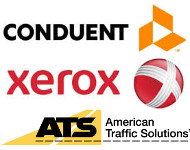5/17/2017
Baltimore, Maryland Restarts Faulty Traffic Camera SystemNew photo ticketing program in Baltimore, Maryland mostly run by team responsible for past failure.

The same for-profit companies responsible for Baltimore, Maryland's error-plagued photo enforcement program are back. The city's Board of Estimates is expected later today to approve a new contract that puts Xerox back in charge of the city's red light cameras, with the only difference being that the photo ticketing division of Xerox now goes by the name Conduent.
The word "Xerox" became toxic in relation to automated ticketing after independent audits revealed tens of thousands of motorists had been falsely accused of speeding. As first reported by the Baltimore Sun newspaper, some of the Xerox cameras were so inaccurate that one out of three tickets went to drivers who were traveling within legal limits.
Baltimore's inspector general blasted both Xerox and city officials over their disregard for accuracy (view report). Xerox continued mailing out thousands upon thousands of tickets knowing full well that "radar errors" caused questionable speed readings. The city's lax process of "reviewing" citations only allowed for a 9 second glance at each alleged violation before hitting the "submit" button -- not enough to watch the 12 second videos that accompany each alleged red light camera violation.
To contain the public relations damage from the scandal, the city council fired Xerox and turned to an inexperienced firm, Brekford, to run the photo radar devices in 2012. Brekford was supposed to use the existing Xerox equipment, but Xerox refused to cooperate. Without access to proprietary Xerox software, Brekford failed to revive the program.
The bad faith between Xerox and Brekford makes it surprising that Baltimore would invite American Traffic Solutions (ATS) to run the speed camera portion of the new photo ticketing contract. In 2009, Conduent was operating under the ownership of Affiliated Computer Services, which filed a federal lawsuit against ATS for refusing to turn over red light camera equipment in Baltimore.
The Baltimore contracting board is also expected to approve a no-bid contract with MRA Digital, the same firm that certified the faulty Xerox speed cameras to be accurate. Maryland law requires that an independent lab verify the accuracy of speed camera equipment, but investigations by the Maryland Drivers Alliance cast doubt on the firm's reliability. Each of the faulty cameras received a "certificate of calibration" signed by MRA Digital engineer Heinz Stubblefield, complete with scientific-looking graphs taken from Wikimedia Commons.
"The department determined through research that MRA Digital LLC is the only company that has the expertise, business structure, past performance record, and calibration equipment available to service both selected vendors," the contract board claimed.
The two vendors, ATS and Conduent-Xerox, will each install, maintain and operate every aspect of their slice of the "turnkey" ticketing program.
"Responsibilities include: verification of violations and citations; processing and mailing of citations; training; providing expert witness testimony; preparation of court documents; development of electronic court processes; and storage of digital images, video and electronic data in formats approved by the department of transportation," the city's request for proposals on the camera project explained.
Baltimore's cameras have not issued tickets since April 2013, but when operational, the program generated millions in annual revenue with 80 red light cameras and 83 speed cameras. Conduent's initial share of the profit will be $4,167,600, while ATS will collect $5,400,000.


